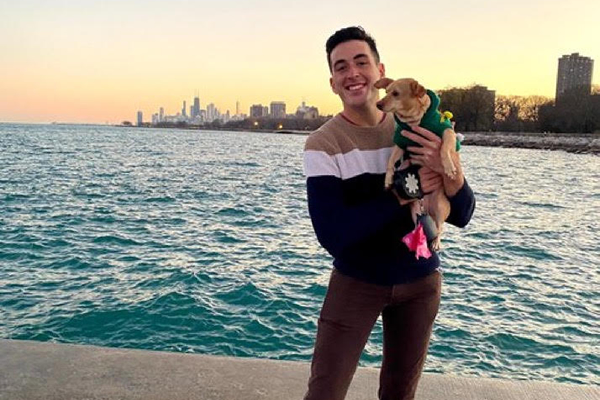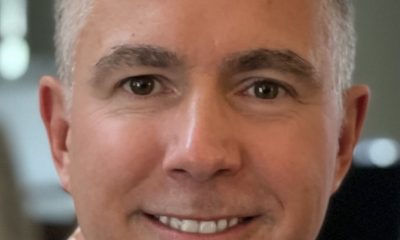National
COVID breakthrough infections strike summer tourists visiting Provincetown
Dozens test positive for virus after weekend getaway

Dozens of summer tourists who were among those visiting the gay resort town of Provincetown, Mass., over the weekend came back with more than beach memories and a tan: They tested positive for COVID-19 — even though they were vaccinated against the disease.
The surprise outbreak among individuals who did their public duty to get vaccinated is taking many observers aback at a time when Americans who refuse to get the shot, despite overwhelming evidence of safety and effectiveness in combatting coronavirus, are facing heavy criticism, which experts say precludes the nation from reaching herd immunity.
Robert Coy, a gay 28-year-old business strategist from Chicago, told the Washington Blade he tested positive for coronavirus on Monday after learning about mild symptoms among housemates during his visit to Provincetown.
“It was just kind of wild,” Coy said. “You went through the whole year-and-a-half of the pandemic and you got vaccinated and do what you’re supposed to do. There wasn’t really any negative pressure against traveling over the Fourth of July for a vaccinated person.”
Coy, who said he was vaccinated in April and is now largely asymptomatic aside from a mild cough, said finding out about the dozens of people who came down with coronavirus after visiting Provincetown despite being vaccinated was “really surprising.”
“Here in Chicago, I think it’s the same in D.C., but people are drawn out here on the dance floor until four in the morning on a Saturday night, and no one has really seemed to be affected,” Coy said. “So the whole experience was kind of unexpected.”
At the same time, Coy said he’s glad no severe cases were being reported and called the breakthrough outbreak “a nice reminder that we’re still kind of learning.”
To be sure, the anecdotal reports of COVID infections among vaccinated people who went to Provincetown doesn’t justify refusing the vaccine. All signs and evidence show COVID-19 vaccines are safe and effective, as medical experts continue to say as they try to convince Americans, many of whom are intransigent against the vaccine, to take their shots.
But the COVID breakthrough cases over a short period of time weren’t insignificant in number and put in stark relief the limitations of the vaccine in fully shielding people from coronavirus, including vulnerability from individuals spreading the disease by refusing shots and fears about the emerging Delta variant.
Kyle Blaine, a White House reporter for CNN, was among the more high-profile individuals who reported having contracted coronavirus after visiting Provincetown over the weekend.
“PSA: If you were in Provincetown last week and have cold/flu symptoms, please get tested for Covid,” Blain tweeted on Sunday. “My husband and I are fully vaccinated and tested positive yesterday. We’re OK — only mild symptoms so far. I know close to a dozen other vaccinated people who tested positive.”
Michael Ahrens, a 32-year-old gay D.C. resident who came down with coronavirus after spending a week in Provincetown, said he initially obtained a negative test result after returning from his vacation, then upon taking a second test Monday out of an abundance of caution tested positive for COVID.
“I think, in that moment, I wasn’t as surprised because I had started hearing about more people testing positive, but I really didn’t have any symptoms, so I was surprised because of that,” Ahrens said. “If you had told me a few days prior, that a bunch of fully vaccinated people were going to be testing positive for COVID, I wouldn’t have believed you.”
None of the coronavirus cases associated with visiting Provincetown appear to be life-threatening. The COVID patients who spoke with the Blade said they had mild symptoms such as fatigue and a mild cough, but exhibited no signs of major illness.
One person, however, said on Twitter in response to a local reporter’s public inquiry for stories he was among the breakthrough cases and had been hospitalized as a result of his condition. The individual didn’t immediately respond by Blade deadline to go on the record and elaborate further on the severity of his illness.
David Hardy, a Los Angeles-based scientific and medical consultant, said the breakthrough infections are “a difficult situation on which to comment due to the imprecise nature of the information available.”
“It would be highly surprising to discover that ‘dozens’ of fully vaccinated tourists (gay or straight) were becoming ill with COVID-19 after visiting P-Town,” Hardy said. “We know that all three vaccines given EUA status in the U.S. reduce the chance of contracting COVID-19 illnesses by 85 percent to 95 percent. Recent data from studies evaluating the new Delta variant becoming more common in the U.S. now show that these three vaccines still protect against COVID-19 illness.”
Hardy added, however, what isn’t known is whether the vaccines “prevent infection with SARS-CoV-2, the cause of COVID-19.”
“Limited data says that the chance of infection is reduced by ~70%-75% after vaccination, which is good but not great,” Hardy said. “Persons with asymptomatic SARS-CoV-2 infection can still transmit the virus.”
A firm count on the number of tourists who went to Provincetown over the weekend and came back with coronavirus would be impossible. After all, individuals could have visited the resort over the weekend, returned home with COVID-19 and gotten their test result elsewhere or never got tested because they remain asymptomatic.
The number of coronavirus cases reported by the Barnstable County Department of Public Health last week was between 20 to 25 and more than half were “short-term visitors,” according to local WBZ reporter Louisa Moller.
Sean Holihan, a gay D.C. resident who visited Provincetown over the July 4th holiday, counted himself on Twitter among almost 30 tourists who came down with COVID as he cautioned against reading too much into the infections.
“Between myself and others, I know of nearly 30 breakthrough cases of Covid that came from visiting Provincetown for the 4th of July,” Holihan wrote. “In each and every situation, the symptoms were mild and no one required a hospital visit. The vaccine works.”
A Massachusetts Department of Health spokesperson said specific cases for Provincetown weren’t immediately available, but “breakthrough case numbers are incredibly low and cases in which the person was hospitalized or died are even lower.”
As of July 10, the total number of breakthrough cases reported to the Massachusetts Department of Health was 4,450 cases out of 4,195,844 vaccinated individuals, the spokesperson said. That fraction is 0.1 percent of vaccinated individuals.
“All available data continue to support that all three vaccines used in the U.S. are highly protective against severe disease and death from all known variants of COVID-19.,” the spokesperson said. “The best way to protect yourself and your loved ones is to get vaccinated.”
Having chosen a gay resort town for a vacation getaway, many of the tourists who went to Provincetown were members of the LGBTQ community and predominantly gay white men. COVID infection in a community that commonly holds progressive views runs counter to the narrative the virus is spreading among Trump-supporting Americans who refuse to get vaccinated despite assurances of safety and the dangers of contracting COVID.
Coronavirus would have ample opportunity to spread among the tourists in Provincetown. Beach parties during the day and club dancing at night, not to mention the close proximity of tourists cramming themselves into group homes to lower costs of their visit, would have been called “super-spreader” events at the peak of the pandemic.
At least one venue was strict about requiring proof of vaccination before allowing entry into the festivities, turning away those without vaccination cards or even cards showing proof of having taken one of two vaccine shots needed for full vaccination. Other venues, however, were lax at a time when Americans would be expected to have vaccinations before gathering in a large crowd and required no proof of immunity before allowing patrons to enter.
Additionally, a ferry tourists commonly use for travel between the Boston airport and the Provincetown resort was cancelled over the weekend due to inclement weather, forcing visitors to cram themselves in crowded buses to get to their destination without open air or social distancing protecting them from infection.
Despite having contracted the disease, the COVID patients who spoke to the Blade said coming down with the disease despite having been vaccinated has done nothing to change their views.
Coy said the coronavirus outbreak may be evidence the restrictions lifted in recent weeks were too many, too quick and more caution should be exercised.
“All the restrictions just kind of ripped away within such a short time span,” Coy said. “I don’t think there was any major caution encouraged as far as going out or as you’re traveling, like continuing to really be vigilant and stay within a small circle of people.”
Ahrens said having come down with coronavirus after receiving his vaccination has done nothing to dissuade him from his belief the vaccine is safe and effective.
“I followed guidance for fully vaccinated people and fortunately people who are vaccinated are having a much easier time fighting off COVID than people who are not vaccinated,” Ahrens said.
CORRECTION: An initial version of this article misspelled the name of Robert Coy. The Blade regrets the error.

The Comings & Goings column is about sharing the professional successes of our community. We want to recognize those landing new jobs, new clients for their business, joining boards of organizations and other achievements. Please share your successes with us at [email protected].
Congratulations to Gil Pontes III on his recent appointment to the Financial Advisory Board for the City of Wilton Manors, Fla. Upon being appointed he said, “I’m honored to join the Financial Advisory Board for the City of Wilton Manors at such an important moment for our community. In my role as Executive Director of the NextGen Chamber of Commerce, I spend much of my time focused on economic growth, fiscal sustainability, and the long-term competitiveness of emerging business leaders. I look forward to bringing that perspective to Wilton Manors — helping ensure responsible stewardship of public resources while supporting a vibrant, inclusive local economy.”
Pontes is a nonprofit executive with years of development, operations, budget, management, and strategic planning experience in 501(c)(3), 501(c)(4), and political organizations. Pontes is currently executive director of NextGen, Chamber of Commerce. NextGen Chamber’s mission is to “empower emerging business leaders by generating insights, encouraging engagement, and nurturing leadership development to shape the future economy.” Prior to that he served as managing director of The Nora Project, and director of development also at The Nora Project. He has held a number of other positions including Major Gifts Officer, Thundermist Health Center, and has worked in both real estate and banking including as Business Solutions Adviser, Ironwood Financial. For three years he was a Selectman, Town of Berkley, Mass. In that role, he managed HR and general governance for town government. There were 200+ staff and 6,500 constituents. He balanced a $20,000,000 budget annually, established an Economic Development Committee, and hired the first town administrator.
Pontes earned his bachelor’s degree in political science from the University of Massachusetts, Dartmouth.
Kansas
ACLU sues Kansas over law invalidating trans residents’ IDs
A new Kansas bill requires transgender residents to have their driver’s licenses reflect their sex assigned at birth, invalidating current licenses.

Transgender people across Kansas received letters in the mail on Wednesday demanding the immediate surrender of their driver’s licenses following passage of one of the harshest transgender bathroom bans in the nation. Now the American Civil Liberties Union is filing a lawsuit to block the ban and protect transgender residents from what advocates describe as “sweeping” and “punitive” consequences.
Independent journalist Erin Reed broke the story Wednesday after lawmakers approved House Substitute for Senate Bill 244. In her reporting, Reed included a photo of the letter sent to transgender Kansans, requiring them to obtain a driver’s license that reflects their sex assigned at birth rather than the gender with which they identify.
According to the reporting, transgender Kansans must surrender their driver’s licenses and that their current credentials — regardless of expiration date — will be considered invalid upon the law’s publication. The move effectively nullifies previously issued identification documents, creating immediate uncertainty for those impacted.
House Substitute for Senate Bill 244 also stipulates that any transgender person caught driving without a valid license could face a class B misdemeanor, punishable by up to six months in jail and a $1,000 fine. That potential penalty adds a criminal dimension to what began as an administrative action. It also compounds the legal risks for transgender Kansans, as the state already requires county jails to house inmates according to sex assigned at birth — a policy that advocates say can place transgender detainees at heightened risk.
Beyond identification issues, SB 244 not only bans transgender people from using restrooms that match their gender identity in government buildings — including libraries, courthouses, state parks, hospitals, and interstate rest stops — with the possibility for criminal penalties, but also allows for what critics have described as a “bathroom bounty hunter” provision. The measure permits anyone who encounters a transgender person in a restroom — including potentially in private businesses — to sue them for large sums of money, dramatically expanding the scope of enforcement beyond government authorities.
The lawsuit challenging SB 244 was filed today in the District Court of Douglas County on behalf of anonymous plaintiffs Daniel Doe and Matthew Moe by the American Civil Liberties Union, the ACLU of Kansas, and Ballard Spahr LLP. The complaint argues that SB 244 violates the Kansas Constitution’s protections for personal autonomy, privacy, equality under the law, due process, and freedom of speech.
Additionally, the American Civil Liberties Union filed a temporary restraining order on behalf of the anonymous plaintiffs, arguing that the order — followed by a temporary injunction — is necessary to prevent the “irreparable harm” that would result from SB 244.
State Rep. Abi Boatman, a Wichita Democrat and the only transgender member of the Kansas Legislature, told the Kansas City Star on Wednesday that “persecution is the point.”
“This legislation is a direct attack on the dignity and humanity of transgender Kansans,” said Monica Bennett, legal director of the ACLU of Kansas. “It undermines our state’s strong constitutional protections against government overreach and persecution.”
“SB 244 is a cruel and craven threat to public safety all in the name of fostering fear, division, and paranoia,” said Harper Seldin, senior staff attorney for the ACLU’s LGBTQ & HIV Rights Project. “The invalidation of state-issued IDs threatens to out transgender people against their will every time they apply for a job, rent an apartment, or interact with police. Taken as a whole, SB 244 is a transparent attempt to deny transgender people autonomy over their own identities and push them out of public life altogether.”
“SB 244 presents a state-sanctioned attack on transgender people aimed at silencing, dehumanizing, and alienating Kansans whose gender identity does not conform to the state legislature’s preferences,” said Heather St. Clair, a Ballard Spahr litigator working on the case. “Ballard Spahr is committed to standing with the ACLU and the plaintiffs in fighting on behalf of transgender Kansans for a remedy against the injustices presented by SB 244, and is dedicated to protecting the constitutional rights jeopardized by this new law.”
National
After layoffs at Advocate, parent company acquires ‘Them’ from Conde Nast
Top editorial staff let go last week

Former staff members at the Advocate and Out magazines revealed that parent company Equalpride laid off a number of employees late last week.
Those let go included Advocate editor-in-chief Alex Cooper, Pride.com editor-in-chief Rachel Shatto, brand partnerships manager Erin Manley, community editor Marie-Adélina de la Ferriére, and Out magazine staff writers Moises Mendez and Bernardo Sim, according to a report in Hollywood Reporter.
Cooper, who joined the company in 2021, posted to social media that, “Few people have had the privilege of leading this legendary LGBTQ+ news outlet, and I’m deeply honored to have been one of them. To my team: thank you for the last four years. You’ve been the best. For those also affected today, please let me know how I can support you.”
The Advocate’s PR firm when reached by the Blade said it no longer represents the company. Emails to the Advocate went unanswered.
Equalpride on Friday announced it acquired “Them,” a digital LGBTQ outlet founded in 2017 by Conde Nast.
“Equalpride exists to elevate, celebrate and protect LGBTQ+ storytelling at scale,” Equalpride CEO Mark Berryhill said according to Hollywood Reporter. “By combining the strengths of our brands with this respected digital platform, we’re creating a unified ecosystem that delivers even more impact for our audiences, advertisers, and community partners.”
It’s not clear if “Them” staff would take over editorial responsibilities for the Advocate and Out.




















